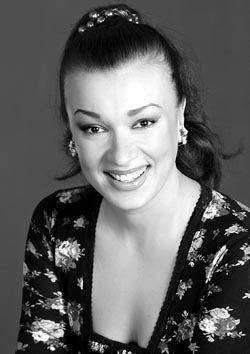Kateryna Strashchenko: “My fate was determined by Yevhenia Miroshnychenko”

Apart from five premieres, the last completed season of the National Opera, its 140th, was marked by an unprecedented number of prestigious titles and awards that were presented on the final day. Among the celebrities was Kateryna Strashchenko, a captivating, rich lyric-dramatic soprano.
As Merited Artist of Ukraine, she will first perform in Yalta during the opening ceremony of the international festival called Stars of the Planet. This will be a kind of warm-up before the next theater season that includes new performances and concert tours. Opera fans in Japan are particularly looking forward to the National Opera’s performances of Turandot, Manon Lescaut, and La Traviata. In the first two Strashchenko will perform the roles of Liu and Manon.
“My family has no connection to music,” the singer admitted. “My parents worked at the Krasny kotelshchik factory in Tahanrih. When I was five, they sent me to a music school. My grandmother would take me to classes. I became a leading singer even at the daycare center and performed on all festive days. I realized that my vocation was music and singing in school, where I was often excused from classes to take part in all kinds of competitions and concerts. When I left school, I began studying singing in earnest.
Why did you decide to study singing in Kyiv?
My aunt was living here, so my parents let me go without worrying too much. Maybe it was destiny that led me to an unmatched singer, my future professor, Yevhenia Miroshnychenko. By the way, I didn’t get into the conservatory on my first try and I returned to Tahanrih. At school I was a Young Pioneer leader. Then I received a call from Miroshnychenko, who suggested that I audit her classes. She had remembered me from when I wrote the entrance exams. When classes started, she asked, ‘Where is Kateryna?’ When she was told that I had failed, Miroshnychenko shouted, ‘What do you mean she failed?’ and went to the entrance examination board, dug up my file, and found my phone number. That was how my destiny was formed. True, I entered the conservatory only on my fourth try, but they transferred me to the second year subgroup.
Since Yevhenia Miroshnychenko specializes in training coloratura sopranos, you were an exception.
I turned out to have a broad vocal range. Many professors came to listen to my voice to determine its type, among them Yevdokia Kolesnyk and Viktor Kurin. But I consider Miroshnychenko my number-one professor. I worshipped her, although she was a tough taskmaster; sometimes I even cried. Some of her students couldn’t endure her demanding approach and quit. I’m sure that I mastered the vocal art thanks to her demanding nature.
You joined the National Opera while you were still at the conservatory.
In 1999, when I was in my fourth year, I was offered the part of Mimi in La Boheme. After working in the theater for almost two years, I took my graduation exams on its stage, during the premiere of Pagliacci. The examining board determined that my Nedda was my graduation mark. Since then I have performed many roles. My favorites are Tosca and Cio-Cio San. I’m also very fond of Mimi, but for some reason Mykola Diadiura, the conductor and director of La Boheme, sees me as the frivolous Musetta. I sing this part, although I still like Mimi better. There is hardly a singer who can say that she has performed every part she has ever dreamed of. Also, it’s too early to speak about dreams that never came true. Anyway, there are operas in the repertoire for which I am ready, but in which I haven’t performed yet. I dream about doing Norma (Miroshnychenko and I worked on it). I started singing in Manon Lescaut two years after the premiere. Our impresario, Yamamoto, says that during our concert tour of Japan I will be commissioned to sing in Manon Lescaut. I’m not sure if I should feel happy about this, but I am flattered.
Where else have you performed?
I sang Tosca in Kazan (Russia) and was invited to perform in Pagliacci and La Boheme in Baku (Azerbaijan). Such tours are interesting because you can work with singers from various vocal schools. Last season I performed in two concerts at the National Philharmonic Society dedicated to the memory of the conductor Stefan Turchak and Giacomo Puccini. Concerts allow me to broaden my performing range and add chamber pieces to my operatic repertoire. I want to record my first disk of French music with arias and songs by Claude Debussy, Joseph-Maurice Ravel, and Manuel de Falla. The program is ready. All I need is a sponsor, but this is easier said than done in the sphere of classical music.
You are not only a singer but also a wife and mother. Is it easy to combine bohemian life with family obligations?
Our four-year-old daughter Liza lives in a bohemian family. I met my future husband Yurii Avramchuk, who is a soloist with the National Opera, at the conservatory. We work on the same stage. Because of our frequent concert tours and our work schedule, we have to hire a nanny. Of course, there are problems. Our daughter likes to go to the theater, but she prefers ballet. She will listen to an opera only if I am part of the cast. When Liza was only two months old, Madama Butterfly was staged in Austria. I had signed the contract when I was pregnant, but I never told the management that I was expecting. So when it came time to perform, the baby and I had to travel there together. The organizers arranged for two-room apartments because Liza’s nanny was with us. So our baby started going on tours while she was still in the cradle. My husband and I try to spend our free time together.






